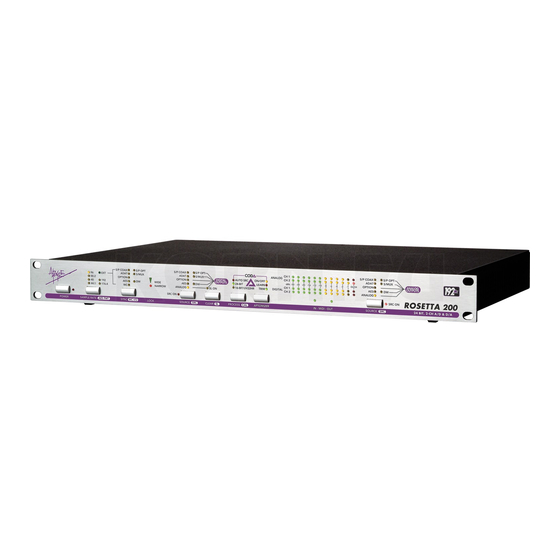Apogee Rosetta 200 Panduan Pengguna - Halaman 13
Jelajahi secara online atau unduh pdf Panduan Pengguna untuk Konverter Media Apogee Rosetta 200. Apogee Rosetta 200 20 halaman. 2-channel 24 bit, 192 khz, ad/da converter
Juga untuk Apogee Rosetta 200: Lembar data (2 halaman), Buku Putih (2 halaman)

ROSETTA 200 – User's Guide
Navigating the Front Panel -
6)
WC I/O (Word Clock I/O Ratio) – This parameter determines the ratio between the Word Clock Input/Output
frequency and the unit's sample rate.
•To set the ratio between a Word Clock Input and the unit sample rate (when locked to WC):
1 Connect a word clock signal to the Word Clock In, set SAMPLE RATE to EXT, and set SYNC to WC.
Verify that both the Wide and Narrow Lock LEDs light.
2 While holding down the SYNC button, press the SAMPLE RATE button to toggle to the desired sample
rate range.
• To set the ratio between the Word Clock Output frequency and the unit's sample rate (when locked to all
other internal or external clock sources).
1 Select the desired sample rate or external clock source.
2 While holding down the SYNC button, press the SAMPLE RATE button to toggle to the desired word
clock output frequency range.
7)
LOCK – These LEDs indicate the Lock status of the Rosetta 200's clock. Two levels of lock precision are
displayed, Wide and Narrow. When both Wide and Narrow are lit, the Rosetta 200 has locked to the selected
CLOCK SOURCE in such a way as to ensure the highest quality conversion. If only the Wide LED lights, the
stability of the clock source is questionable, and the source should be verified.
8)
SOURCE (to Digital Outputs) – This parameter selects the input source that is routed to ALL digital
outputs. To employ the Rosetta 200's A/D converters, set this parameter to Analog.
9)
SRC (Sample Rate Conversion) – When a digital source has been selected, press and hold SOURCE (to
Digital Outputs) to engage SRC. Please see AUTO SRC (below) for more detailed information..
10) CLEAR - This button clears the meter's OUCH (OVER) LEDs
11) SOFT LIMIT – Press and hold CLEAR to engage SOFT LIMIT on both analog inputs. Soft Limit is an
analog process that rounds transient peaks –4 dBFs and above with attack and release times that may be
considered instantaneous. As with any peak reduction device working at such fast time constants, Soft Limit
is most effective with signals whose peak information is greater than its average (or RMS) information, such
as drums, plucked instruments and dynamic mixes. Soft Limit may not be the appropriate choice for limiting
signals whose crest factor (peak to RMS ratio) is low, such as bass or organ.
12) CODA – The CODA Audio Finishing Module is comprised of three processes : SRC (Sample Rate
Conversion), UV22HR and APTOMIZER.
13) PROCESS – This parameter toggles AUTO SRC on and off and sets digital output resolution to 24 or 16bit/UV22HR
AUTO SRC (Sample Rate Conversion) – When AUTO SRC is engaged, sample rate conversion is
automatically applied to digital inputs when needed. If a selected digital input is detected to be non-
synchronous with the unit's clock, sample rate conversion is automatically applied to the input and the
corresponding SRC LED lights.
24-BIT/16-BIT/UV22HR – When the unit sample rate is set to a range of 44.1-48k, the bit resolution of all
digital outputs may be set to either 24-Bit or 16-Bit/UV22HR. When 16-Bit/UV22HR is selected, Apogee's
proprietary dither signal, UV22HR, is employed to encode 24-bit resolution in a 16-bit signal.
Please note: AUTO SRC will be available in a future software upgrade.
continued
7
6
8
9
10
11
12
13
5
APOGEE ELECTRONICS
